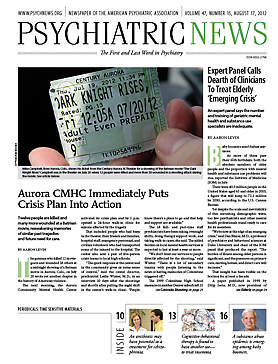Five years ago, a Japanese psychiatrist and his colleagues observed something peculiar regarding two schizophrenia patients.
One was a 23-year-old man who had been hospitalized for a first episode of schizophrenia. While in the hospital he developed a severe case of pneumonia, which was treated with the antibiotic minocycline. Two weeks later, his schizophrenia symptoms resolved along with his pneumonia.
The other was a 61-year-old man who was diagnosed with schizophrenia at age 20. During his most recent hospitalization for it, he developed a bedsore that was treated with minocycline. Two weeks later, the bedsore healed, and minocycline was discontinued. The patient’s schizophrenia symptoms worsened. Minocycline was resumed; within three days, the patient’s schizophrenia symptoms improved.
“I was so surprised by these developments,” the psychiatrist—Tsuyoshi Miyaoka, M.D., an associate professor of psychiatry at Japan’s Shimane University School of Medicine—told Psychiatric News. “Could minocycline have antipsychotic properties? I wondered.”
Pursuing Their Hunch
Miyaoka and his colleagues decided to explore this possible relationship by conducting a small open-label study. They gave minocycline (150 mg/d) as an adjunct to antipsychotic medication to 22 individuals with schizophrenia for a four-week period. Evaluation of the subjects showed reduction of more than 50 percent in both positive and negative symptoms. These results, even considering a possible placebo effect, suggested that minocycline might possess antipsychotic properties. And what was especially promising was that it seemed to be capable of countering negative symptoms, which are usually intractable.
Deanna Kelly, Pharm.D., director and chief of the Treatment Research Program at the University of Maryland’s Maryland Psychiatric Research Center, read about these developments. “I was really excited about them,” she said during an interview, and thus she and her colleagues Robert Buchanan, M.D., and Gopal Vyas, D.O., decided to explore minocycline’s putative antipsychotic potential.
They gave minocycline to several patients with severe schizophrenia. As Vyas told Psychiatric News, he noted changes in these patients that he had never seen before in them. For instance, “Several showed improvement in group attendance and participation. One who exhibited more than a moderate amount of catatonic behavior was far more engaged in his treatment and was able to be successfully discharged after a prolonged hospitalization. He remains in the community to this day.”
About the same time, results from a randomized, double-blind, placebo-controlled trial that had been conducted on minocycline and schizophrenia were published in the February 2010 Journal of Clinical Psychiatry. The results, Kelly said, “got us even more fired up about minocycline’s potential against schizophrenia.”
Yechiel Levkovitz, M.D., of the Shalvata Mental Health Care Center in Hod-Hasharon, Israel, and colleagues had conducted a trial in 54 subjects with early-phase schizophrenia. The subjects had been given an atypical antipsychotic plus minocycline (200 mg/d) or an atypical antipsychotic plus a placebo and were followed for six months.
Minocycline showed a beneficial effect against not just negative symptoms, but against cognitive deficits—deficits that, like negative symptoms, are usually difficult to treat.
Still other minocycline-related schizophrenia results were published in April in the Journal of Psychopharmacology by Bill Deakin, M.D., a professor of psychiatry at the University of Manchester in England, and his international team. These results further persuaded Kelly that minocycline possesses antischizophrenia properties.
In that study, 144 subjects with early-phase schizophrenia had received antipsychotic treatment as usual plus minocycline or antipsychotic treatment as usual plus a placebo for an eight-week period. Minocycline was found to significantly reduce negative symptoms and somewhat improve positive ones.
But How Might It Work?
So what about this antibiotic is leading to hope that it can be a weapon against schizophrenia, and especially the usually intractable negative symptoms and cognitive deficits of the illness? “We don’t really know for sure,” Kelly acknowledged. “But minocycline is known to be capable of countering inflammation and of crossing the blood-brain barrier into the brain, and there is also growing evidence that inflammation might play a role in the pathophysiology of schizophrenia. So minocycline might be able to counter schizophrenia by countering inflammation in the brain.”
Only more research will show whether minocycline is truly an effective medication against schizophrenia, and such research is under way.
Kelly, Buchanan, and Vyas are conducting a randomized, double-blind, placebo-controlled trial, funded by the National Institute of Mental Health, to further explore minocycline’s impact on schizophrenia. Fifty subjects with severe schizophrenia who have shown only a partial or no response to the antipsychotic clozapine are being randomized to receive either minocycline (100 mg twice daily) plus clozapine or a placebo plus clozapine for 10 weeks.
“We are looking for its effects on positive and negative symptoms,” Kelly said. “We are also studying cognition to see whether minocycline helps with areas such as memory and learning. And we are measuring the levels of inflammatory markers called cytokines in the subjects’ blood, since we suspect that minocycline may counter schizophrenia by reducing inflammation in the brain. We hope to have results next spring.”
A similar trial is being launched at the University of Texas Health Sciences Center in Houston, Kelly noted.
Also, a $3 million clinical trial of minocycline in schizophrenia patients is getting under way in the United Kingdom, the Independent newspaper reported March 2. It is being financed by that country’s National Institute for Health Research.
Meanwhile, schizophrenia experts are placing their bets on whether minocycline will turn out to be an effective treatment for schizophrenia.
“Since all [experimental drugs for negative symptoms or cognitive deficits in schizophrenia] have failed to date, you’ve got to bet that the next one will fail as well,” William Carpenter, M.D., director of the Maryland Psychiatric Research Center and chair of the DSM-5 Psychotic Disorders Work Group, said. “But … if minocycline has efficacy for negative symptoms, cognitive impairment, or both, that would be terrific … and transformative for the field.”
“If minocycline had a clinically significant benefit for negative symptoms and cognitive impairments, then that would be a major scientific and therapeutic breakthrough,” Buchanan observed. “I would give it a 50/50 chance [of success], which is quite optimistic for me.”
“This is an interesting and off-the-beaten-track approach to augmentation of antipsychotic effects and the targeting of negative symptoms,” Peter Buckley, M.D., told Psychiatric News. Buckley is dean of the Medical College of Georgia and has conducted schizophrenia research. “There is now a renewed interest in infections and the immunology of schizophrenia,” he added. “So this type of drug may have great relevance. Time will tell.”
Vyas had this to say: “I am very optimistic that minocycline will provide relief for some of the most debilitating symptoms of schizophrenia.”
“From our experience and clinical research, I believe that minocycline will turn out to be a truly revolutionary treatment for schizophrenia,” Miyaoka declared.


